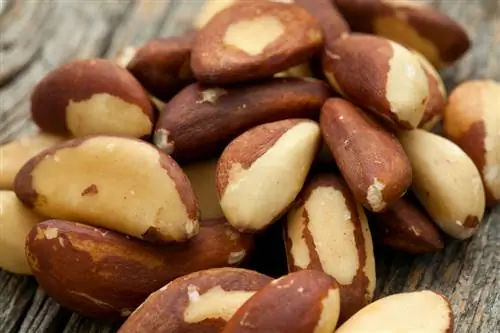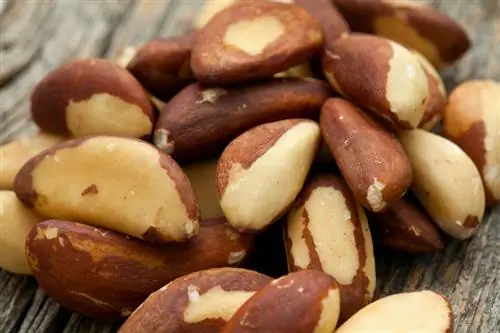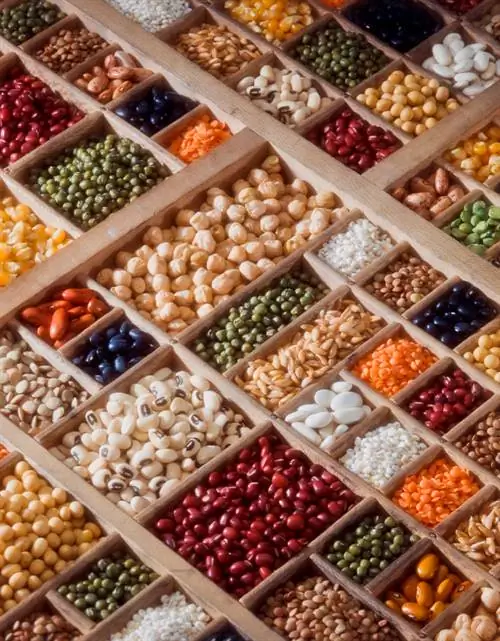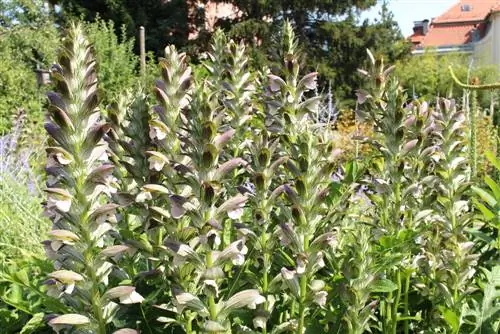- Author admin [email protected].
- Public 2023-12-16 16:46.
- Last modified 2025-01-23 11:20.
No other plant-based food contains as much selenium as the fruit of the Brazil nut tree. But it's not just the selenium content that makes the nut so he althy. It also contains many minerals and vitamins - but unfortunately also a lot of fat.

How much selenium does the Brazil nut contain?
The Brazil nut is the richest plant source of selenium, with 1.9 milligrams per 100 grams. Consuming just two Brazil nuts can meet an adult's daily selenium needs, protect against free radicals and support nerve he alth.
How much selenium does the Brazil nut contain?
100 grams of Brazil nuts contain 1.9 milligrams of selenium. No edible plant has such a high selenium content.
Selenium is one of the antioxidants that protect the body's cells from free radicals. These penetrate into body cells and are considered one of the most important causes of cancer.
Selenium prevents cell degeneration. Scientific studies indicate that the trace element acts as a protection against nerve diseases such as multiple sclerosis or Alzheimer's.
Two nuts cover the daily requirement
According to experts, just consuming a few nuts covers the daily requirements of an adult.
If you add a few Brazil nuts to your diet three to four times a week, you will optimally supply your body with the important trace element.
Brazil nuts are very high in fat
Brazil nuts are not only sought after because of their high selenium content. They contain a number of substances that the human body needs to maintain its functions.
The fat content is very high at 66.4 grams per 100 grams of Brazil nuts; only pecans contain more fat. However, these are mainly he althy unsaturated and polyunsaturated fatty acids.
100 grams of Brazil nuts contain 660 calories. People who suffer from obesity or are on a diet should therefore only consume Brazil nuts in very small quantities.
What else does the Brazil nut contain besides selenium and fat
- Fiber
- Sodium
- Magnesium
- Phosphorus
- Potassium
- Calcium
- Iron
- Zinc
- Vitamins C, B6, B12, E
Mold infestation of Brazil nuts
The kernels of the Brazil nut are eaten raw. Removing them from the extremely hard shell requires some effort. That's why the nuts are often sold already peeled and polished.
Unfortunately, there is a risk of dangerous mold forming on the nuts, which is harmful to he alth and can cause poisoning.
It is therefore better to only buy unpeeled Brazil nuts and only crack them shortly before consumption. Peeled nuts must be used as quickly as possible.
Pay attention to the taste
The high fat content of Brazil nuts can cause the nuts to quickly go rancid. This can be recognized by a bad smell.
Rancid nuts taste very unpleasant. Fresh, he althy Brazil nuts have a sweet, nutty aroma.
Brazil nuts that taste or smell strange should not be eaten and should be thrown in the trash can.
Tips & Tricks
In contrast to hazelnuts and many other types of nuts, Brazil nuts very rarely cause allergies. However, if you feel a burning sensation on your tongue or get swelling when eating them, you are one of the people who are allergic to Brazil nuts.



